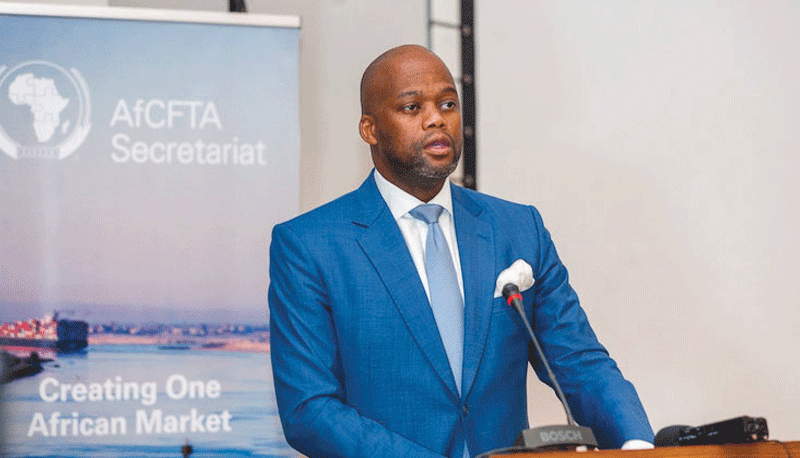
The agreement establishing the African Continental Free Trade Area (AfCFTA) was signed in March 2018 and came into force in May 2019.
However, trading under the new agreement commenced on January 1, 2021.
As of September 2023, 54 of the 55 African Union member states had signed the agreement with 47 ratifying it.
The main objective of the AfCFTA is to create a single market for goods and services facilitated by the movement of people to deepen the economic integration of the African continent.
The AfCFTA targets a market of 1.2 billion people representing US$2.5 trillion in cumulative GDP.
The AfCFTA is being implemented to address the low performance of African countries in terms of intra-African trade, which is struggling to evolve compared to Europe and America, even if some progress has been recorded.
By removing trade barriers, fostering regional integration, promoting economic diversification, and attracting investments, implementation can unlock the full potential of the AfCFTA and drive sustainable and inclusive economic growth across the continent.
However, evidence, data, policies, and practice form a foundation for successful AfCFTA implementation.
- Queen Lozikeyi singer preaches peace
- Business opinion: Branding through Artificial Intelligence
- Business opinion: Branding through Artificial Intelligence
- Digitalising the marketing of financial services
Keep Reading
They enable informed decision-making, policy formulation, monitoring and evaluation, stakeholder engagement, addressing challenges, and fostering a culture of learning.
By relying on evidence and data, policymakers can navigate the complexities of trade integration, optimise resource allocation and ensure that AfCFTA implementation delivers the intended economic and social benefits for African countries.
Some key challenges in implementing the AfCFTA
Political and security issues
Although the AfCFTA pays attention to Africa as a continent, the implementation will be at the national level 10.
However, policies have a crucial role to play in successful implementation. This requires political will at the level of heads of state in the development and effective implementation of national policies related to the implementation of the AfCFTA.
Policies play a crucial role in boosting private sector investment in trade, and their predictability is a key factor in creating a favorable investment environment.
When policies related to trade are clear, consistent, and transparent, they provide certainty and reduce risks for private sector participants, encouraging them to invest and engage in international trade, therefore, supporting AfCFTA implementation.
Furthermore, peace, security, and political stability in African countries are necessary conditions for the implementation of the AfCFTA.
The insecurity and terrorism that reign in some regions must be resolved to promote the free movement of goods, services, and people promised by the AfCFTA.
Infrastructure challenges
Economically, for African countries to reap the full benefits of the AfCFTA and to be globally competitive, they need to invest more in critical infrastructure by promoting innovation and technology.
Indeed, the African continent suffers greatly from a deficit in terms of infrastructure to support the implementation of the AfCFTA.
According to the conclusions of the AfCFTA Business Forum (2023), Africa needs to improve these infrastructures with a level of investment ranging from US$130 to US$170 billion per year.
In 2023, the financing gap amounts to US$68-108 billion, which means that only around 34% of the population has access to electricity and that 40% live more than five km from the road.
These challenges increase logistics costs which could represent up to 40% of the cost of trading goods among African nations.
Digital divide
With globalisation, the challenge of digital trade policy must be resolved.
Digitalisation is accelerating Africa’s connectivity to the rest of the world.
It will make it possible to accelerate the implementation of the AfCFTA, but the institutional and regulatory framework is not yet effective.
Furthermore, a common digital trade policy must be explored to protect Africans.
Although currently, some countries (such as South Africa, Nigeria, Senegal, and Kenya) have started to put in place digital trade policies, there is a need for harmonisation at the continental level within the framework of the AfCFTA to facilitate coordination.
Private sector engagement
Engaging the private sector, including small and medium-sized enterprises (SMEs), is crucial for the success of AfCFTA.
SMEs often face barriers to trade, limited access to finance, and inadequate market information.
Limited knowledge about trade procedures, market access requirements, and the potential for expanding into new markets can hinder private sector engagement.
SMEs often face capacity constraints in terms of production capabilities, quality standards, technology adoption, and access to finance.
Complex and burdensome regulatory frameworks, including customs procedures, licensing requirements, and documentation processes, can pose challenges for businesses, particularly SMEs.
Lack of access to affordable credit and insurance products for trade transactions can impede businesses’ ability to seize new market opportunities.
The prevalence of informal and unstructured operations poses significant challenges for the private sector and necessitates attention to evidence building and policy formulation.
Nearly 83% of employment in Africa and 85% in Sub-Saharan Africa is informal.
The informal sector in Africa comprises a substantial portion of economic activity, with a large number of businesses operating outside formal regulatory frameworks.
These businesses often face barriers to accessing formal financing, technology, markets, and other resources necessary for growth and competitiveness.
The lack of formalisation limits their ability to engage in cross-border trade effectively.
The informal nature of the African private sector poses significant limitations to its full participation in trade.
Addressing this issue requires a comprehensive approach encompassing policy reforms, enhanced data collection methods, and targeted interventions to foster formalization and integration into formal value chains.
Institutional capacity and coordination
Implementing AfCFTA requires strong institutional capacity at the national and regional levels.
Many African countries need to enhance their trade-related institutions, including customs administrations, standards agencies, and regulatory bodies.
Moreover, the lack of harmonization in regulations across countries and regions creates barriers to trade and investment.
Divergent regulatory frameworks, customs procedures, and standards increase transaction costs, create uncertainty, and hinder the smooth flow of goods and services across borders.
This fragmentation limits market access, reduces competitiveness, and discourages private sector engagement in cross-border trade.
Coordinating actions and policies among member states and regional economic communities is essential but can be challenging.
African countries vary significantly in terms of their institutional capacity, resources, and development levels.
Some countries may have stronger institutions and better capacity to implement AfCFTA, while others may struggle due to limited resources or expertise.
Bridging the capacity gap among member states is crucial to ensure equitable participation and benefit sharing.
- Ronald Zvendiya is an independent Policy analyst. rzvendiya@gmail.com.These weekly articles are coordinated by Lovemore Kadenge, an independent consultant, managing consultant of Zawale Consultants (Private) Limited, past president of the Zimbabwe Economics Society and past president of the Chartered Governance & Accountancy Institute in Zimbabwe. Email - kadenge.zes@gmail.com or mobile No.+263 772 382 852.










